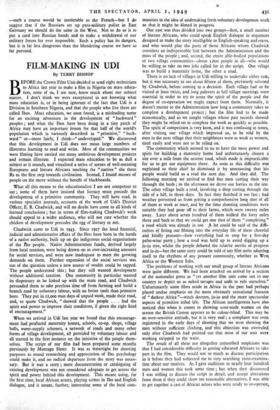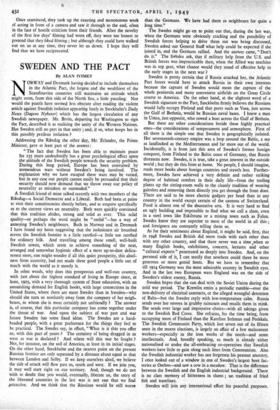FILM-MAKING IN UDI
By TERRY BISHOP
BEFORE the Crown Film Unit decided to send eight technicians to Africa last year to make a film in Nigeria on mass educa- tion, none of us, I am sure, knew much about our subject matter. I don't think we were exceptional in not knowing what mass education is, or in being ignorant of the fact that Udi is a Division in Southern Nigeria, and that the people who live there are called Ibos. Mass education, we soon found, is a misleading name for an exciting adventure in the development of " backward " peoples ; and what the Ibos have been doing in a tiny patch of Africa may have an important lesson for that half of the world's population which is variously described as " primitive," " back- ward " or—more fairly, I think—" undeveloped." We discovered that this development in Udi does not mean large numbers of illiterates learning to read and write. Most of the communities we were filming have carried out many ambitious development projects and remain illiterate. I expected mass education to be as dull a subject as it sounds, and visualised a series of scenes of well-meaning Europeans and literate Africans teaching the "natives " the three Rs as the first step towards civilisation. Instead, I found masses of people on the move without the benefit of blackboards.
What all this means to the educationalists I am not competent to say ; some of them have insisted that literacy must precede the developmen; of a primitive community. They will have read, in various specialist journals, accounts of the work of Udi's District Officer, E. R. Chadwick, and will no doubt have come to all kinds of learned conclusions ; but in terms of film-making Chadwick's work should appeal to a wider audience, who will not care whether the chicken of development precedes the egg of literacy or not.
Chadwick came to Udi in 1943. Since 1927 the local financial, judicial and administrative affairs of the Ibos have been in the hands of a native authority, built up on the indigenous social organisations of the rbo people. Native Administration funds, derived largely from local taxation, were being drawn on in ever-increasing amounts for social services, and were now inadequate to meet the growing demands on them. Further expansion of the social services was out of the question unless a new source of wealth could be tapped. The people understood this ; but they still wanted development without additional taxation. One community in particular wanted its dispensary to be linked up with the main road, and Chadwick persuaded them to take precious time off from farming and build a branch road by voluntary labour, with no better tools than primitive hoes. They put in 12,000 man days of unpaid work, made their road, and, to quote Chadwick, " showed that the people . . . had the spirit and power to improve their conditions, if given the right kind of encouragement."
When we arrived in Udi last year we found that this encourage- ment had produced maternity homes, schools, co-op. shops, village halls, water-supply schemes, a network of roads and many other forms of village development, all provided by voluntary labour and all started in the first instance on the initiative of the people them- selves. The script of our film had been prepared some months previously by Montagu Slater. It was as watertight for shooting purposes as sound researching and appreciation of Ibo psychology could make it, and no radical departure from the story was neces- sary. But it was a story ; mere documentation or cataloguing of existing development was not considered adequate to get across the spirit and power behind this development. This meant using, for the first time; local African actors, playing scenes in Ibo and English dialogue, and it meant, further, interesting some of the local corn-
munities in the idea of undertaking fresh voluntary development work so that it might be filmed in progress.
Our cast was thus divided into two groups—first, a small number of literate Africans, who could speak English dialogue in sequences designed to make the story intelligible to English-speaking audiences, and who would play the parts of those Africans whom Chadwick considers an indispensable link between the Administration and the mass of the people ; and, second, the entire able-bodied populations of two village communities—about 1,600 people in all—who would be willing to take on two jobs called for in the script. One village was to build a maternity home, the other a road.
There is no lack of villages in Udi willing to undertake either task, but it was necessary to see about fifteen of them, previously selected by Chadwick, before coming to a decision. Each village had to be visited at least twice, and long palavers at full village meetings were essential in order to try to sense the spirit of the people and the degree of co-operation we might expect from them. Normally, it doesn't matter to the Administration how long a community takes to complete a development project ; but the film had to be made economically, and so we sought villages whose past records showed they might be relied on to complete the work as quickly as possible. The spirit of competition is very keen, and it was confusing at times, after visiting one village which impressd us, to be told by the men in the next village that their neighbours were as weak as women, tired easily and were not to be relied on.
The community which seemed to us to have the most power and spirit for building a maternity home had unfortunately chosen a site over a mile from the nearest road, which made it impracticable for us to get our equipment there. As soon as this difficulty was explained to their chief he dismissed it by announcing that his people would build us a road the next day. And they did. The following morning we arrived to find 800 men cutting their way through the bush ; in the afternoon we drove our lorries to the site. The other village built a road, involving a deep cutting through the side of a hill, in three days. In fact they finished it too fast ; bad weather prevented us from getting a comprehensive long shot of all of them at work at once, and by the time shooting conditions were suitable they had gone off to their farms, which were twenty miles away. Later about seven hundred of them walked the forty miles there and back so that we could get one shot of them " completing " a road which was already in use. A lot could be said of the diffi- culties of fitting our filming into the everyday life of these cheerful and kindly peasants—how everything had to stop for a -five-day palm-wine party ; how a road was held up to avoid digging up a ju-ju tree, whilst the people debated the relative merits of progress and ju-ju—but the same story could be told of any film units adapting itself to the rhythms of any peasant community, whether in West, Africa or the Western Isles.
The problems of working with our small group of literate Africans were quite different. We had been attacked on arrival by a section of the nationalist press as " yet another film unit come out to our country to depict us as naked savages and unfit to rule ourselves." Unfortunately some films made in Africa in the past had perhaps placed undue emphasis on the more obviously sensational features of " darkest Africa "—witch doctors, ju-ju and the more spectacular aspects of primitive tribal life. The African intelligentsia have also noticed that when it comes to showing semi-nude women on the screen the British Censor appears to be colour-blind. This may be an over-sensitive attitude, but it is very real ; a complaint was even registered in the early days of shooting that we were showing the men withdut sufficient clothing, and this objection was overruled,
only after Chadwick had pointed out most of our unit were working stripped to the waist.
The result of all these not altogether unjustified suspicions was that I had considerable difficulty in getting educated Africans to take part in the film. They would not so much as discuss participation in it before they had subjected me to very searching cross-examina- tion about our motives. As I gave auditions to nearly four hundred men and women this took some time ; but when they discovered I was willing to discuss the script in detail, and accept alterations from them if they could show me reasonable alternatives, I was able to get together a cast of African actors who were ready to co-operate,
Once convinced, they took up the exacting and monotonous work of acting in front of a camera and saw it through to the end, often in the face of hostile criticism from their friends. After the novelty of the first few days' filming had worn off, they were too honest to pretend that they liked filming ; but although they could have walked out on us at any time, they never let us down. I hope they will find that we have reciprocated.







































 Previous page
Previous page